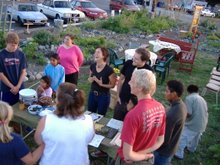 i do what i hate:
i do what i hate:more stories from the women's jail
by amy muia
On Sunday in the women’s jail Bible study, we addressed the very difficult but foundational topic of powerlessness. It’s one of the steps in alcoholics anonymous . . . admitting that our lives are out of control. The women said they had been to hundreds of “meetings;” the idea was quite familiar. But they were surprised to find it in Scripture: I don't really understand myself, for I want to do what is right, but I don't do it. Instead, I do what I hate. (Romans 7:15)
This raised some interesting questions . . . who is to blame? They’ve spent a lot of time blaming others (boyfriends, fathers, mothers, friends who betrayed them). And they’ve spent a lot of time blaming themselves (I’m no good; I can’t change; I must be defective). Yet Paul scandalously says, “So I am not the one doing wrong; it is sin living in me that does it.” (v.17)
“Yeah, but we need to take ownership of what we’ve done,” one woman said. “I need to admit that I was the one, and not somebody else.”
“But admitting you’re powerless is the first step to freedom,” another woman said. “That you’re out of control.”
I mentioned a conversation I’d had with a woman earlier in the week: “I met a guy who was a drug dealer, and he wanted to go on a date,” she had told me. “In my head, I knew it was death. And in my heart, I didn’t want to go. But I watched myself get into the car. I watched myself drive to his house. I watched myself use. I didn’t even want to. I don’t understand myself.”
I told them of the many times I’d seen women stand before the judge and say, “This isn’t me. I don’t belong in jail.” Judges are usually unsympathetic to this line of reasoning, but I could see that each woman was very sincere as she said it. Like Paul, they meant it when they said, “This isn’t really me.”
The women around the circle were all nodding. They could relate to the idea of forces acting upon them, as Paul describes. Something pushing them to do just the opposite of what they really want to do.
We continued to talk about powerlessness. There was a woman present with two black eyes, numerous abrasions, and a large gash on her forehead. I remembered her from past Bible studies; she never asked prayer for herself, but she always wanted prayer that her dog was safe. She began speaking—her speech peppered with profanity—and no attempt made to look religious, as many of the women do in ‘church.’
“I was raped last night,” she said. “I was thrown in the back of a truck and a guy was choking me. They were taking me to the river. I was completely powerless. But my last thought before I blacked out was, ‘I believe in Jesus, so I have eternal life if I die . . .’”
“That sounds like the same prayer Jesus prayed before he died,” I said. “'Father, into your hands I commit my spirit.'”
“It was?” the woman asked, shocked that she could have prayed the same prayer as Jesus did. Amazed that Jesus felt the way she felt. She grabbed a pencil and began writing. “How does it go again?”
We continued to grapple with the mystery. Choice is important. Human agency—the power to choose—is God-given. But if it were only about making good choices, the jail would be empty. All the women had made choices to do right; all had made promises. And yet, here they were. We agreed: willpower and best intentions often don’t work. Perhaps what is left is Paul: Who will free me from this life that is dominated by sin and death? Thank God! The answer is in Jesus Christ our Lord. (v. 24-25)
Maybe, I proposed, we should put the blame where it belongs. On the enemy. He is the source of evil, death, and destruction. Our part is that we agree with him, for lots of reasons. We feel unworthy of anything good. We self-sabotage because we’re afraid. We want numbness because it’s too painful to go to the deep places of hurt. We’re angry and want to punish others or ourselves. We don’t trust God; we don’t really know God. Would we be willing to break agreement? To pray Jesus’ prayer: “Father God, into your hands I commit my spirit.”
The women were willing, and we ended with the prayer. I wished we could have debriefed more, but the time was short. The guard banged the door open and the ladies filed out. Please continue to pray for breakthrough for them and for us, as we go deeper into these mysteries of the kingdom of God.







